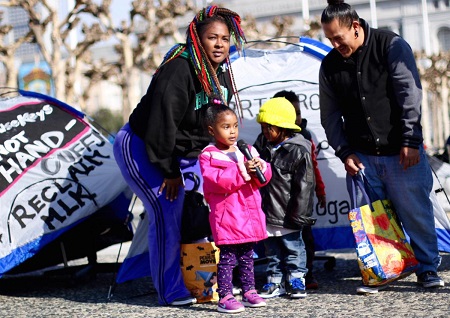If approved by [the United States] Congress, this budget would make massive cuts to Medicaid and welfare programs. It would drive millions of people off food stamps, with a 25 percent cut to a program that provides a vital lifeline to accessing food for some 42 million Americans, many of whom are working poor. Trump’s budget would also eliminate the Home Investment Partnerships Program, which supports affordable housing ($948 million); the Choice Neighborhoods revitalization program ($125 million); and the Community Development Block Grant program (nearly $3 billion). And it would reduce rental assistance programs by over $1.9 billion—programs that, according to the budget’s own estimates, subsidize rent for 4.5 million very low-income households.
The budget goes on to target people with disabilities by proposing major changes to federal disability programs with cuts of $72 billion over 10 years, and reducing the budget of the Office of Disability Employment Policy, which works to remove barriers to employment for those with disability, by $11 million.
Meanwhile, additional funding would be directed towards building a border wall with Mexico, increasing the Defense Department’s budget by billions of dollars, and hiring more Immigration and Customs Enforcement officers.
The proposed budget suggests that Trump has declared war on the poor in the US. It comes at a time when over half a million Americans are homeless and puts a stop to the decline of homelessness recorded under the Obama administration—a drop of 27 percent, or almost 28,600 people, between 2010 and 2016. California, the Golden State, accounts for nearly half of all unsheltered people in the country and between 2015 and 2016 saw a two percent increase in homelessness.
This photo essay, by photojournalist Rucha Chitnis, gives faces and voices to the people behind these numbers. Documenting economic inequality and homelessness in California’s Bay Area, it shines light on homelessness, the impact of poverty on people with disabilities, and the criminalization of the poor—three significant issues in the US that Trump’s proposed budget will have a devastating impact on. The essay makes it clear that low-income and disabled community members will not see their dreams unleashed by Mr. Trump’s new financial plan. The budget would “Make America Great Again” for the already rich, while devastating the rest.
Importantly, the photo essay also shares the stories and elevates the work of several groups in the Bay Area, including the St. Mary’s Center, ‘First They Came for the Homeless’ encampment protestors, the Western Regional Advocacy Project, and others. The members, volunteers, staff, and supporters of these organizations and initiatives work tirelessly to provide basic assistance, advocate for social safety nets, and reverse the trend of criminalizing the poor. This essay is a tribute to their work and a call for action to join their efforts and mobilize to oppose Trump’s war on the poor.
Original article and photo essay
Photo: Everyone deserves a home,” said a four-year-old girl at the Citywide Homeless People’s Assembly outside San Francisco’s City Hall to commemorate Martin Luther King Jr. Day. According to a 2014 report by the National Center on Family Homelessness, California is the third worst state for child homelessness, with over half a million children affected. Source: Rucha Chitnis / The Oakland Institute.
| Themes |
| • Displaced • Displacement • ESC rights • Homeless • Housing rights • Human rights • Low income • National • Public programs and budgets |














